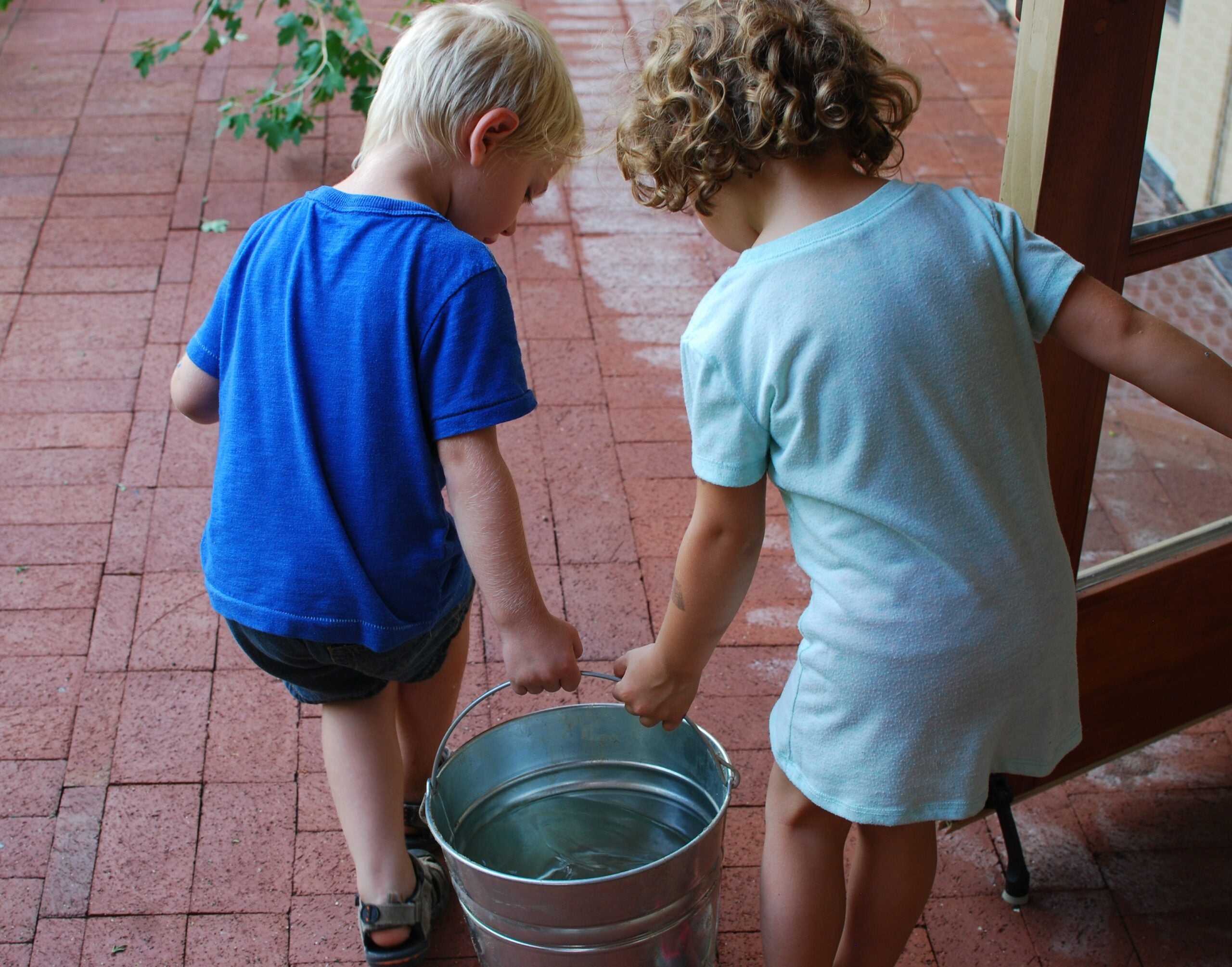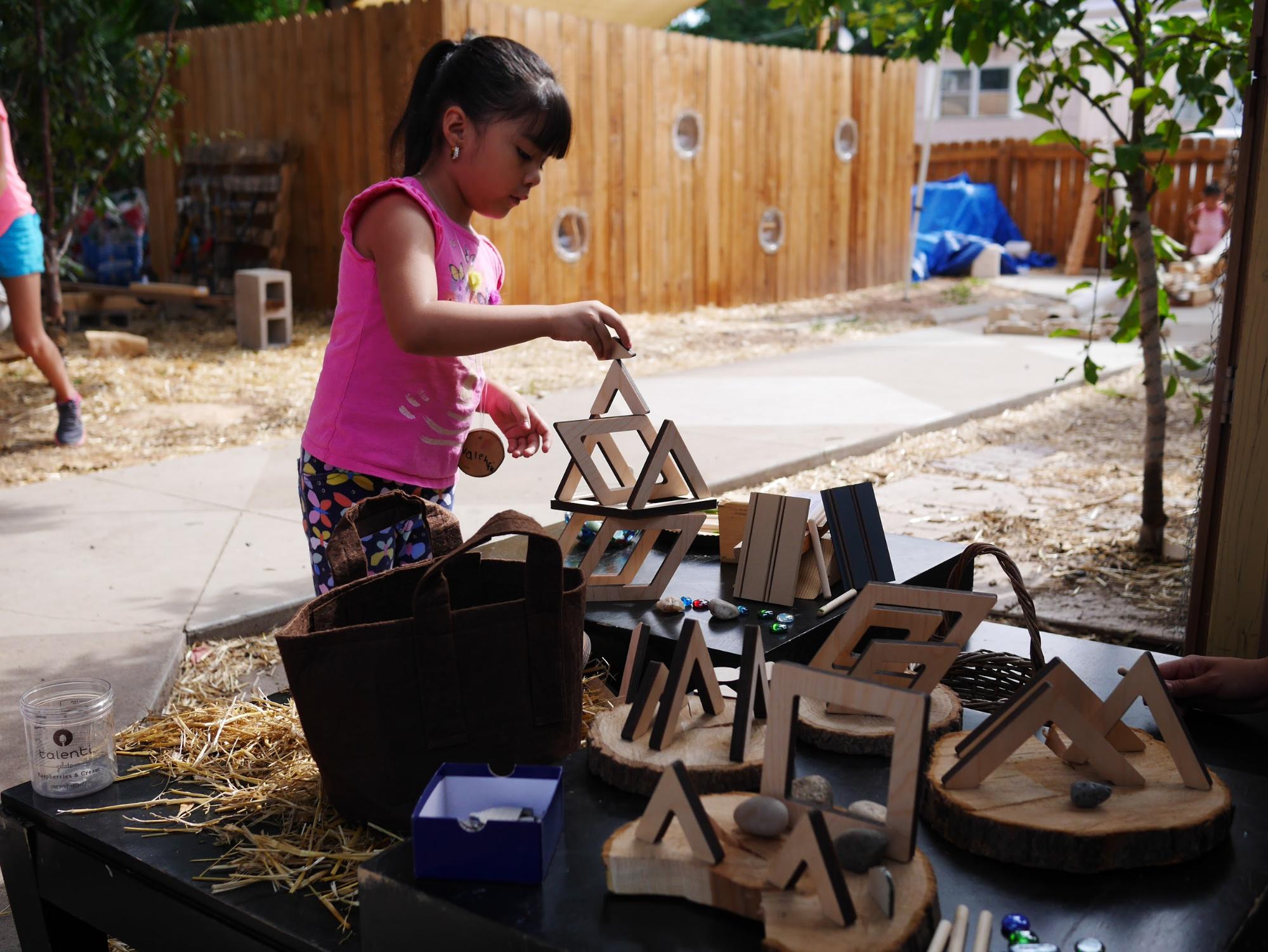If you read Monday’s post or are familiar with Kodo, then you know how committed we are as advocates for play in early childhood education. We write a great deal about experiences which take place indoors and would like to take this opportunity to speak about the unique benefits of outdoor play. Besides, it’s spring and we’ve got our windows open here along Colorado’s front range!
 Both indoor and outdoor play share the benefits of encouraging problem solving, critical thinking, and child-led investigation. However, outdoor play brings with it many other benefits. For example, a study by the American Academy of Pediatrics shows that children are far more likely to engage in active play when outdoors than when indoors. This difference in activity can have monumental impact on a child’s health, reducing likeliness for obesity and the health problems that come with it, such as diabetes, bone and joint problems, and sleep apnea, among others. The study sadly also showed that most 3-5 year olds aren’t getting the two hours per day of recommended physical activity, and encourages increased outdoor play to help children meet the requirements.
As well as improvements in health, outdoor play helps students focus better in the classroom. In fact, a study conducted by the University of Illinois showed that just 20 minutes in a park-like setting helped children with ADHD concentrate in the classroom and increased overall focus.
The key to unlocking these benefits is unstructured, free play. While participating in a teacher led activity, game, or sport does reap the benefits provided by fresh air and sunshine, free outdoor play allows children to explore their natural world and their place in it, and to exercise critical thinking, problem solving, and creativity skills while pursuing their own unique interests. When facilitating outdoor free play, we can apply the principles we discussed in Monday’s article, Make Time for Play, as well as Tuesday’s article, Ask Open Ended Questions. If you are able to be more flexible in your routine and increase the amount of time your children are afforded to engage in free, open, outdoor play, you will observe benefits not just in health, but in classroom behavior and performance as well. Children who are healthier, content, can focus, and are more apt to collaborate - all from a few more minutes of fresh air, activity, and free choice. We say give it a try - you’ll benefit as well!
Both indoor and outdoor play share the benefits of encouraging problem solving, critical thinking, and child-led investigation. However, outdoor play brings with it many other benefits. For example, a study by the American Academy of Pediatrics shows that children are far more likely to engage in active play when outdoors than when indoors. This difference in activity can have monumental impact on a child’s health, reducing likeliness for obesity and the health problems that come with it, such as diabetes, bone and joint problems, and sleep apnea, among others. The study sadly also showed that most 3-5 year olds aren’t getting the two hours per day of recommended physical activity, and encourages increased outdoor play to help children meet the requirements.
As well as improvements in health, outdoor play helps students focus better in the classroom. In fact, a study conducted by the University of Illinois showed that just 20 minutes in a park-like setting helped children with ADHD concentrate in the classroom and increased overall focus.
The key to unlocking these benefits is unstructured, free play. While participating in a teacher led activity, game, or sport does reap the benefits provided by fresh air and sunshine, free outdoor play allows children to explore their natural world and their place in it, and to exercise critical thinking, problem solving, and creativity skills while pursuing their own unique interests. When facilitating outdoor free play, we can apply the principles we discussed in Monday’s article, Make Time for Play, as well as Tuesday’s article, Ask Open Ended Questions. If you are able to be more flexible in your routine and increase the amount of time your children are afforded to engage in free, open, outdoor play, you will observe benefits not just in health, but in classroom behavior and performance as well. Children who are healthier, content, can focus, and are more apt to collaborate - all from a few more minutes of fresh air, activity, and free choice. We say give it a try - you’ll benefit as well!
 Both indoor and outdoor play share the benefits of encouraging problem solving, critical thinking, and child-led investigation. However, outdoor play brings with it many other benefits. For example, a study by the American Academy of Pediatrics shows that children are far more likely to engage in active play when outdoors than when indoors. This difference in activity can have monumental impact on a child’s health, reducing likeliness for obesity and the health problems that come with it, such as diabetes, bone and joint problems, and sleep apnea, among others. The study sadly also showed that most 3-5 year olds aren’t getting the two hours per day of recommended physical activity, and encourages increased outdoor play to help children meet the requirements.
As well as improvements in health, outdoor play helps students focus better in the classroom. In fact, a study conducted by the University of Illinois showed that just 20 minutes in a park-like setting helped children with ADHD concentrate in the classroom and increased overall focus.
The key to unlocking these benefits is unstructured, free play. While participating in a teacher led activity, game, or sport does reap the benefits provided by fresh air and sunshine, free outdoor play allows children to explore their natural world and their place in it, and to exercise critical thinking, problem solving, and creativity skills while pursuing their own unique interests. When facilitating outdoor free play, we can apply the principles we discussed in Monday’s article, Make Time for Play, as well as Tuesday’s article, Ask Open Ended Questions. If you are able to be more flexible in your routine and increase the amount of time your children are afforded to engage in free, open, outdoor play, you will observe benefits not just in health, but in classroom behavior and performance as well. Children who are healthier, content, can focus, and are more apt to collaborate - all from a few more minutes of fresh air, activity, and free choice. We say give it a try - you’ll benefit as well!
Both indoor and outdoor play share the benefits of encouraging problem solving, critical thinking, and child-led investigation. However, outdoor play brings with it many other benefits. For example, a study by the American Academy of Pediatrics shows that children are far more likely to engage in active play when outdoors than when indoors. This difference in activity can have monumental impact on a child’s health, reducing likeliness for obesity and the health problems that come with it, such as diabetes, bone and joint problems, and sleep apnea, among others. The study sadly also showed that most 3-5 year olds aren’t getting the two hours per day of recommended physical activity, and encourages increased outdoor play to help children meet the requirements.
As well as improvements in health, outdoor play helps students focus better in the classroom. In fact, a study conducted by the University of Illinois showed that just 20 minutes in a park-like setting helped children with ADHD concentrate in the classroom and increased overall focus.
The key to unlocking these benefits is unstructured, free play. While participating in a teacher led activity, game, or sport does reap the benefits provided by fresh air and sunshine, free outdoor play allows children to explore their natural world and their place in it, and to exercise critical thinking, problem solving, and creativity skills while pursuing their own unique interests. When facilitating outdoor free play, we can apply the principles we discussed in Monday’s article, Make Time for Play, as well as Tuesday’s article, Ask Open Ended Questions. If you are able to be more flexible in your routine and increase the amount of time your children are afforded to engage in free, open, outdoor play, you will observe benefits not just in health, but in classroom behavior and performance as well. Children who are healthier, content, can focus, and are more apt to collaborate - all from a few more minutes of fresh air, activity, and free choice. We say give it a try - you’ll benefit as well!

Share:
Week of the Young Child: Ask Open Ended Questions in Early Childhood Education
Week of the Young Child: To Create Future Innovators, Let the Child Lead